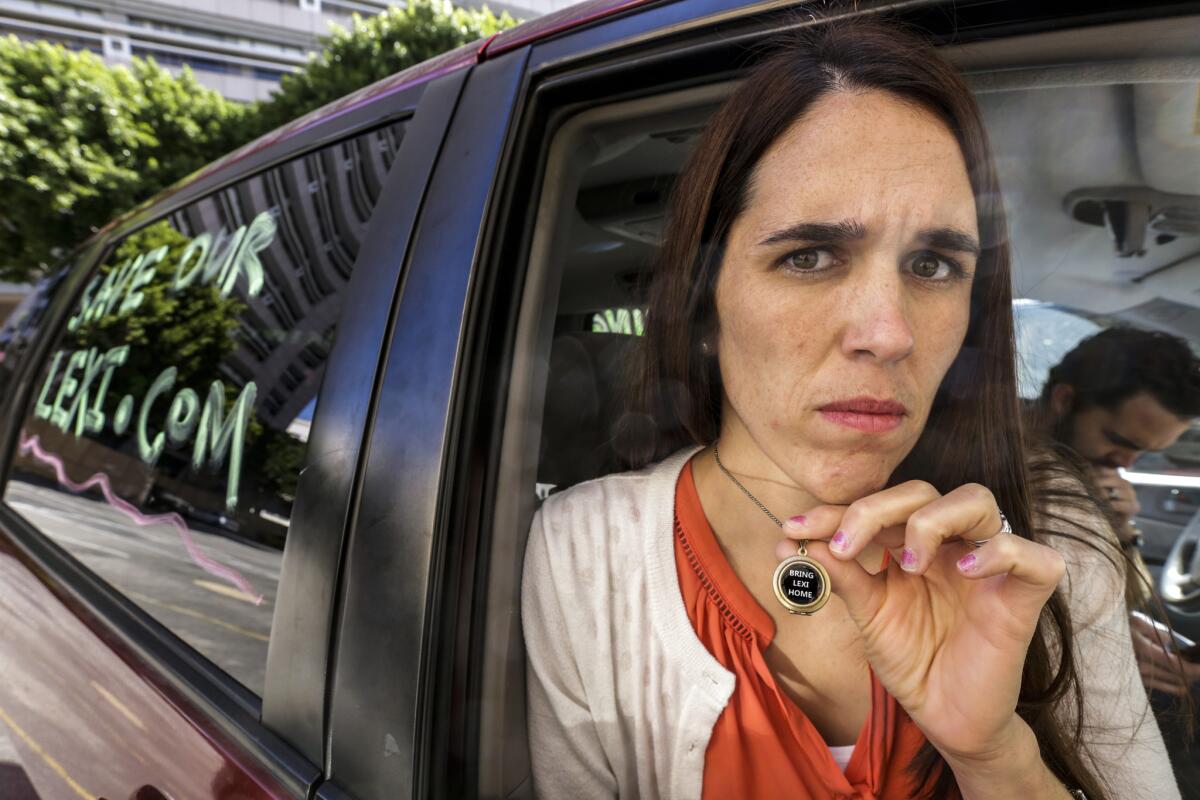State Supreme Court will not hear Santa Clarita family’s appeal in tribal custody case

- Share via
The California Supreme Court will not hear an appeal from a Santa Clarita family to return their longtime foster daughter, who is part Native American, after the girl was removed from their home last week in a tribal custody case.
The court rejected attorney Lori Alvino-McGill’s request without comment Wednesday, and her clients, Rusty and Summer Page, said they are willing to take it to the U.S. Supreme Court if they must.
The 6-year-old girl was removed from the Pages’ home on March 21 and placed with extended family members in Utah, who include a half sister. Because the girl is one-sixty-fourth Choctaw, the federal Indian Child Welfare Act, intended to limit the breakup of Native American families through adoption or foster care placement, applies to her case.
The Page family said that the case would remain with the California Court of Appeal and that they were prepared to take it to the nation’s highest court.
Rusty and Summer Page, speaking to reporters outside the 2nd District Court of Appeal in downtown Los Angeles on Thursday, said they had not been allowed to have any contact with the girl since the court-ordered removal. The girl had lived with the Pages and their three children for more than four years, and the Pages tried unsuccessfully to adopt her.
“She has never gone this long without speaking to us or seeing us, her mommy and daddy,” Rusty Page said.
Armand Montiel, a spokesman for the Los Angeles County Department of Children and Family Services, said Thursday that the girl was in Utah, with her relatives.
Kevin Lapp, an associate professor at Loyola Law School whose focus is juvenile law, said the U.S. Supreme Court’s willingness in 2013 to take up the “Baby Veronica” case — returning a Cherokee girl to her adoptive parents after a long legal battle — suggests a high-court battle isn’t out of the question.
“It suggests that the court isn’t disinterested in dealing with these complicated child welfare cases,” Lapp said.
News cameras and hundreds of supporters were on hand at the family’s Santa Clarita home last week when county workers came to take the child away. In the days since, the Pages and their supporters have flooded social media with calls to bring the girl back, and more than 116,000 people have signed a petition on Change.org.
On Thursday, Rusty Page defended their decision to fight the case in public.
“I don’t know a single parent who wouldn’t scream from the mountaintops or run to the ends of the Earth for their child, and that’s what we’ve done,” he said.
Speaking directly to the girl, he said, “Since no one has allowed you to contact us, I will remind you what you told me just before they came to take you away: You told me I was your Superman, and that’s exactly what I’m going to be for as long as it takes.”
Page said the county had taken a “politically correct stand for the tribe” and was not acting in the girl’s best interest.
The girl had regular visits with her out-of-state relatives before being placed with them, said Leslie Starr Heimov, executive director of the Children’s Law Center of California, the court-appointed law firm that represents foster youths.
An L.A. Superior Court judge previously ruled that the girl should be placed with her Utah relatives, and the girl remained with the Pages as appeals dragged on and the California appeals court identified mistakes by the lower courts.
An appellate court stay preventing the removal of the girl from California was lifted earlier this month when the 2nd District Court of Appeal denied a writ petition filed by the Pages, Heimov said.
“There are two families that love her,” Heimov said. “The court has made a decision. We need to follow the law, and we need to enforce the court orders.”
The Oklahoma-based Choctaw Nation has said that “from the beginning of this case, the Choctaw Nation advocated for [the girl’s] placement with her family” and that many steps had been taken to ensure the best placement for her.
An independent clinical psychologist was brought in to gauge her ability to transition from her foster family to her relatives, and a California court appointed a marriage and family therapist to perform a child custody evaluation “to assess the mental health and parenting practices of both parties,” the tribe said in a statement.
While it is fairly common for the Indian Child Welfare Act to apply in the placement of foster children, it is rare for such cases to become as contentious as the Pages’ because the issue usually comes up early in the foster care process, Lapp said. The longer a child stays with a family, he said, the greater the bonds formed and the more difficult removal becomes.
“The delays make it difficult,” he said. “This one is four years into a foster placement, so the removal from the foster home seems more traumatic because of the timing.”
Still, even if the girl had no Native American ties, he said, most dependency courts aim to place siblings together, as will be the case with the girl in Utah.
MORE: Get our best stories in your Facebook feed >>
For breaking California news, follow @haileybranson and @JosephSerna.
ALSO
San Bernardino terrorist attack victims hear how donations will be distributed
Family of engineer killed in Oxnard crash sues Metrolink
Painkiller fentanyl linked to six deaths and numerous overdoses in Sacramento area
More to Read
Sign up for Essential California
The most important California stories and recommendations in your inbox every morning.
You may occasionally receive promotional content from the Los Angeles Times.















